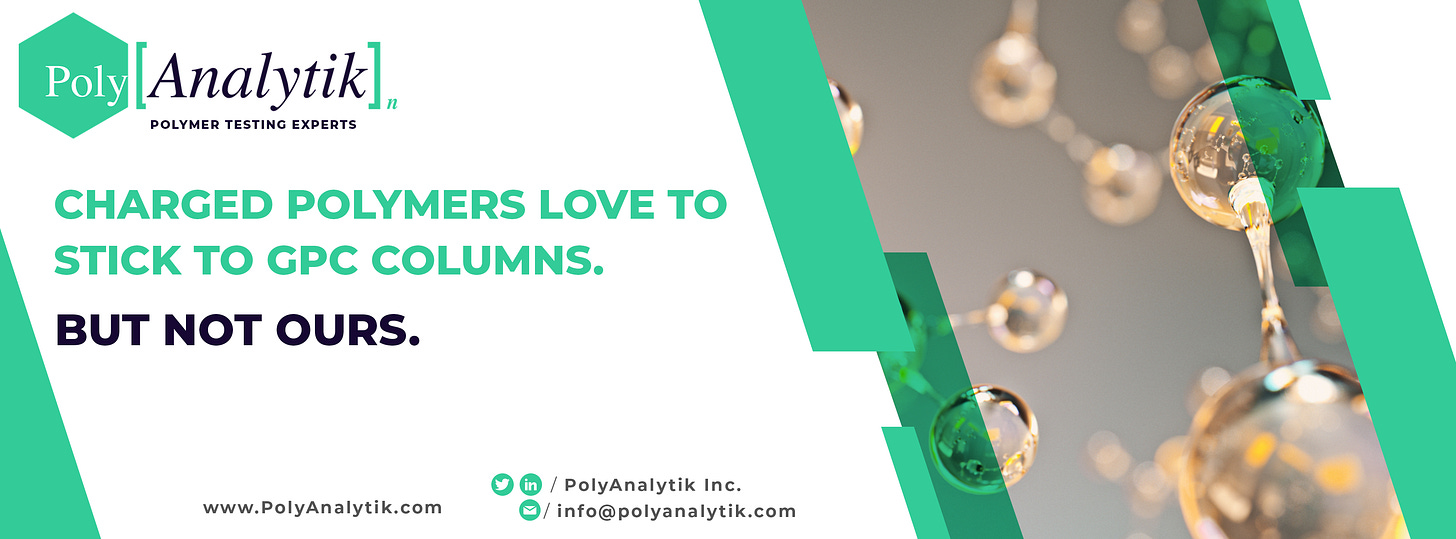Welcome to 2022 at The Polymerist. This is the monthly career oriented post for January. Today’s topic is something that I’ve struggled to write for months now. I’ve started, stopped, and restarted. I decided that perfection is the enemy of success and I just hope that my thoughts are clear. To those who have signed up during my December break I hope my writing brings you some value and welcome to the email list.
This issue and the next 7 of The Polymerist are sponsored by:
I’m not 100% sure when I first went into Crisis Mode, but I think it’s something that I’ve shifted in and out of since being an undergraduate. There was the sense of a looming week of finals where I think a lot of us figured out how to pull all-nighters fueled with coffee and food from 7-11. When I graduated from the University of Maryland in 2009, we had the Great Recession, another crisis.
Currently, we have Covid-19 variants, supply chain disruptions, inflation, climate change, and probably something else coming. Crises are abundant these days. I’m not here to write about that though. I’m after something more selfish, the crises we deal with at our jobs.
These crises are often constructs of people in positions of power that have to answer to others such as their shareholders. Investors want to see a return on their invested capital, so they push the CEO to grow revenue. The CEO pushes aggressive goals to their reports and the goals get cascaded down. Goals almost always need to be accomplished by the end of the year. Many of us just had to have conversations about if we accomplished our goals for 2021.
The goals for 2022 are being set now and the timelines are probably aggressive. I would argue that the timelines leave minimal room for error or account for the fact that almost everyone is getting a new job these days. These sorts of personnel disruptions can leave the remaining team “holding the bag” on someone else’s project.
When we get a new project or we are continuing into the next phase of a large project it’s relatively easy for those with experience to map out the Gantt chart in our minds and see how little room there is for error or supplier disruptions. We (or at least myself here) typically end up pursuing multiple parallel paths towards our goal as a way to mitigate risk of failure. This can also sometimes double or triple the amount of work. Things are worse when you are 100% dependent on others for getting their jobs done so that you can do yours.
A Message From My Sponsor:
Things are kind of crazy right now in the job markets and sometimes the key person who knew how to run that specific analytical experiment is gone or the only person who knew how to maintain that critical piece of equipment got laid off in a round of cost cutting. This is where an analytical services company can really shine with deep expertise and PolyAnalytik knows GPC and polymers really well. If you are in a crisis and need help, consider reaching out to Thomas Gungor.
My first experience with this unique pressure of others being 100% dependent on your work was in graduate school. I had recently joined my thesis adviser’s research group and this other group of polymer engineers at Case Western Reserve University were waiting on my group to supply them with biobased epoxy resins that they could study for viability in making composites. To make matters worse, our research group was moving to a different school that summer, and I had to teach full time in organic chemistry labs. Crisis Mode: On.
Being in Crisis Mode is unique in that it is surprising what we can accomplish. By November of that first year in the group I had successfully synthesized a whole family of new epoxy resins, was working on my very first paper (published in Biomacromolecules), and getting ready for my oral candidacy defense. I had seemingly accomplished something I thought impossible, but what was the cost?
I was in some sort of Crisis Mode throughout graduate school because I was afraid of failure. I was able to publish a lot of papers, but the cost was high in retrospect. My high school friendships had deteriorated to the point of non-existence, I barely saw my friends from college/post college that were outside of polymer chemistry, and the little bit of leftover money I had I spent going to see my family.
Crisis Mode is exhausting. I know a lot of people might still be in some version of it as supply chain crises continue and last minute substitutions for legacy raw materials are made just in time to continue delivering products to customers without disruptions. These situations can also be opportunities for suppliers looking to enter into a new market that was dominated by one or two players who have put their smaller customers on allocation. The term “allocation” means how much a customer can purchase is limited and often doesn’t meet the required demand.
Making a good return on invested capital to your shareholders is important, but having your employees operate in a perpetual state of Crisis Mode is not sustainable. If the business doesn’t make money then it is unlikely that your company will be around for much longer and the same is true if your employees start quitting for better opportunities at your competitors. Jan 3rd was the first working day for most and I saw a slew of people posting on LinkedIn about their new jobs.
The Great Reshuffle
I suspect that the Great Resignation or maybe it should be called the Great Reshuffle will continue. Employees are figuring out what types of careers they want to have, especially after having taken a break at the end of December. It might be a promotion at a competitor or perhaps a role that had been previously denied to them at their current place of employment. Sometimes it's exactly the same job, but without the stress of their current place of employment.
Having a workforce that is constantly on edge is not healthy for a company and as more people leave without a ready replacement the more stressful it is for the remaining employees to carry the extra burden. There is a negative feedback loop of destruction that can feed itself here. At chemical companies this is true across all facets of the company from the operators at the plants to the chemists in the labs to the supply chain professionals trying to find new suppliers. These issues of attrition are even worse when the professionals who covered that extra bit leave and there are not robust business processes that new employees can operate within upon being hired.
If we think of a punishment and reward scenario for employees I suspect that punishment has been the leading motivator for many organizations. In my experience there has always been a “we can get someone else to do your job” mentality even if its unspoken and it’s somewhat true, but I suspect it’s getting more difficult.
I get it. Rewards are costly, but attrition if it runs away can result in brain drains of entire companies. A good example of runaway “managed” attrition was recently profiled by Alex Kantrowitz in Big Technology.
“The crisis right now is good people are leaving, and hiring is struggling,” said a former Amazon director. “And they are being asked to manage people out at a more aggressive rate because they are behind.”
If you are leading a company or are in a position to make decisions my suggestion is to do what you can to retain the people you value. I’m witnessing an unprecedented job market for chemists and engineers right now and I suspect that it will continue into 2022. Here is an excerpt from the venerable Chemjobber in his last column at C&EN:
While I cannot predict the future, I am extremely confident in advising people to apply now. Do not wait until “the right time,” whether it’s next month or next year. Do the work of putting together a résumé and a cover letter as soon as possible. This is an unusually good time to be a job seeker in industrial chemistry. Here’s hoping for a 2022 in which we can be free of this pandemic and we all have that job that we are seeking.
It’s amazing what we can do as scientists and engineers when our backs are against the wall and we have to deliver results, especially when we work together. Crisis Mode should be reserved for crises and it seems like we have been in some sort of crisis for the past two years—both at work and outside of work. We all need a break and I’m hoping that 2022 is the year we get one.







Continual Crisis Mode *is* exhausting, all the more so when the crises are internally generated (often senior people making promises that can't realistically be kept, or over-optimistic scheduling or budgeting that leaves no room for contingent events).
I once worked in an environment where a change in management led to something of a "situational normal" Crisis Mode environment. I left as soon as I could.